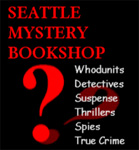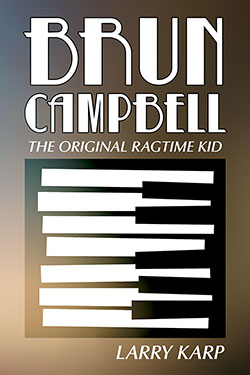|
|
BRUN CAMPBELL: THE ORIGINAL RAGTIME KID
First as The Ragtime Kid, then as The Ragtime Fool, Brun Campbell, Scott Joplin's one-time piano student, was the protagonist in two books of my ragtime historical-mystery trilogy.
For a year and a half, as I worked on A Perilous Conception, I wondered how I might get back to writing about ragtime, but every bright notion faded as quickly as it popped into my mind. Sometimes, though, you get lucky. An antiques dealer emailed to tell me he'd cleaned out the house of a reclusive elderly woman in Venice, California...whose father happened to have been Brun Campbell. When the dealer googled Brun's name, up popped my books. The dealer asked if I would be interested in acquiring three cartons of Brun's "stuff."
Not a week later, three cartons arrived at my door. The "stuff" in them went far beyond anything I might have wished or hoped for. Unpublished manuscripts detailing Brun's life as an itinerant pianist in the midwest and San Francisco a century earlier. Seventy year old unpublished musical compositions. 78 rpm records The Kid had cut during the 1940s. Photographs. Business records. Correspondence with many notable people of the time, including Scott Joplin's widow, Lottie; W.C. Handy, "The Father of the Blues;" and ragtime/jazz historian, Roy Carew. Everything jumbled together in those three cardboard cartons.
As I worked to organize the material, I became more and more convinced that Brun Campbell deserved a re-evaluation. No one else has left us a written account of life as a ragtime pianist in low and rough places during the early years of the twentieth century. And then, forty years later, Brun was one of the first and most energetic ragtime revivalists, spearheading the drive to bring Scott Joplin's music back to life.
Brun was a classic storyteller, a man who could not relate a straight account of an event if his life depended on it. I think it's funny that the work of the Great Ragtime Storyteller ended up some 60 years later in the hands of another storyteller, who, I hope, will give a straighter account than Brun could manage of the wild times of his life.
I hope you'll enjoy reading that account.
Brun Campbell: The Original Ragtime Kid was released by McFarland Books in March of 2016.
A Brief Excerpt
Brun set up the stories of his youthful adventures as seven versions of a work he called "When Ragtime was Young." It was badly organized, whether by time or event, so for this book, I organized the adventures by time, as best I could. Material in italics is by Brun; nonitalicized material is by me, as if in reply. This excerpt tells the story of Brun's encounter with Buffalo Bill.
I happened to be in a saloon when in walked Buffalo Bill himself, with a couple of men. I could see that he had a bit of liquor aboard; he wanted some music, so the bartender asked me to play for him. I declined at first, but Buffalo Bill insisted, and I went over to the piano and hammered out "Carbolic Rag," a new piece I had recently learned and which had quite a left hand run in it. Buffalo Bill was entranced; he came over to the piano and gave me a twenty-dollar gold piece and told me to keep playing as long as he was in the saloon. I must have played it for a fullhour,over and over again – until he left the place, he by then being lit up like a new church.
"Car-bar-lick Acid," a folk rag by Clarence Wiley, is still played at ragtime festivals. The tune was copyrighted and published by the composer in Oskaloosa, IA in 1901, then published by Giles Brothers in 1904, and then by Jerome Remick in 1907. So the public distribution of the music coincides neatly with Brun's years on the road.
As with any tune from Brun's itinerant-pianist days, the young man might not have learned it from sheet music: most bar-barrelhouse-brothel pianists of the day played by ear, and new pieces of music were constantly going viral among them. David Reffkin offers the possibility that Brun might have heard another pianist play "Car-bar-lick Acid" with a substantial run, liked it, and copied it.
I had heard that a friend of my folks', a Mr. Angus Miller, was staying in town at the Royal Hotel, so I stopped off to see him. While we were talking in the lobby who should come in but Buffalo Bill with his friends. He at once saw me and came over and insisted that I accompany him to the parlor and play some more ragtime music. He was not to be denied, so I obliged him. Afterwards, he gave me some money and took a stickpin from his tie and gave it to me as a present. It was a beautiful elk's tooth with a one-carat diamond surrounded by smaller stones, and was engraved with some very small words which I couldn't make out.
At this time Governor Ferguson of Oklahoma came into the parlor and I played some for him. He had some business to discuss with Buffalo Bill, so I left them with handshakes all around.
A streetside plaque in Guthrie states that the Brooks Opera House was "Built in 1899 as an adjunct to the Royal Hotel," and that "the Brooks was praised in its day as the finest theater in the Southwest. It presented popular entertainments and was also the setting for many dazzling 'first nights' for territorial society."
Thomas Benton Ferguson was Governor of the Oklahoma Territory between 1901 and 1906, which corresponded with Brun's days as an itinerant pianist.
That night I was admiring the stickpin and the thought occurred to me that Buffalo Bill had been a bit tipsy when he presented it and perhaps hadn't realized what he was doing. So promptly the next morning, I went back to the hotel and returned it to him. He had missed it but hadn't remembered giving it to me and was very happy to get it back, it being a present from his wife, who was then dead.
"...his wife, who was then dead"? Buffalo Bill's wife, Louisa, to whom he was married for more than 50 years, did not die until 1921, some four years after the death of her famous husband. Not that Brun necessarily fabricated this point. It's easy to imagine how embarrassed Buffalo Bill could have been over his behavior - and if his wife had in fact given him the stickpin, he'd have been more than embarrassed when she next saw him. Perhaps the famous Wild West showman decided to take refuge in a whopper. Too bad Brun did not have a magnifier so he could've read and reported upon those tiny words on the stickpin.
|
 |
Author: Larry
Karp
Softcover: 260 pages
ISBN: 978-1-4766-6345-6
McFarland
Amazon
Barnes & Noble
Also available as an e-book
from Amazon for Kindle
Barnes and Noble for Nook
iTunes for iPhone & iPad
Google Books for
epub and other readers
CD:
Essays in Ragtime: The Music of Brun Campbell, by historian/musician/composer David Reffkin, is a companion piece for this book. Consisting of Brun's compositions, as played by The American Ragtime Ensemble, premier midwestern ragtime pianist Richard Egan, and Brun himself, it has been highly complimented by ragtime enthusiasts, and can be obtained from Rivermont Records.
|
 |
|
Support your independent booksellers.
MysteryBooksellers.com
 is
an excellent resource to find your closest
Independent Mystery Booksellers Association
member. is
an excellent resource to find your closest
Independent Mystery Booksellers Association
member.
|
 All
of Larry Karp's mysteries (including autographed copies
AND books that have gone out of print) can be found
here: All
of Larry Karp's mysteries (including autographed copies
AND books that have gone out of print) can be found
here: |
|





